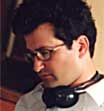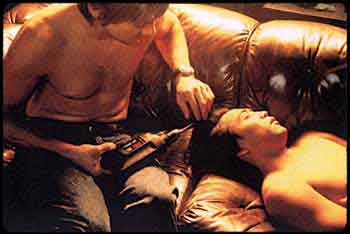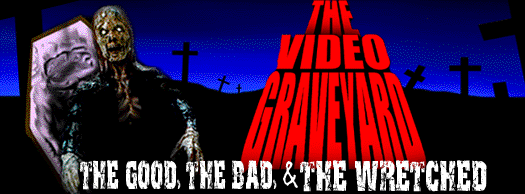 First Look recently released a box set of their three "true story" serial killer flicks: Ed Gein, Ted Bundy and Dahmer. To tie in with this fact we took the opportunity to speak to Dahmer writer/director David Jacobson about what it takes to make a movie that's subject alone makes people deem the filmmakers "sick" for even tackling the project. We spoke to him about his limits and about his intended goal with the movie. How did you become attached to the project? I heard about a book about Dahmer written by his father. I thought that would be a fascinating take on a serial killer, the perspective of the killer's father and it was. Because it was the father writing the book came at the
subject from a very emotional perspective and that is what really grabbed me. I thought you could make an emotionally dramatic film with built in suspense. It became for me a kind of dramatic horror film, a different kind of horror
film. From there I read many more books on the subject and then I went to Milwaukee and studied the court transcripts. There was a lot of info there including a 150 page police confession and many psychiatric depositions. I
then wrote the script and tried to get financing. Perhaps because it wasn't a straight forward exploitation film I couldn't find financing. I used my own money to get it going.
What was your approach going in to an admittedly controversial topic? Whenever I told most people I was going to do a film about Dahmer they cringed and asked me why I would do that. "Are you sick?" I probably am, but I thought there were thousands of reasons to a film about Dahmer. It is so fascinating how a middle class guy in America became a sort of Aztec. Dahmer said at one point he should have been born an Aztec. Ultimately, I go back to the emotional issues. He killed men because he wanted to be close to them, not just to express an giant rage. He said he didn't want them to leave him. This is what blew my mind. He was having feelings that most people feel and then acted on them in the most extreme way. Because I felt I was making a film about emotions and not just a film to give pure thrills or shock, I felt it was a worthwhile thing to do.  How close to real events were you allowed to go - and how much did you? Pretty much everything in the film was reported in newspapers or in the court transcripts. There are very few though for the most part is made up. The characters other than Dahmer are sometimes composites so I could communicate as
much as possible about the story in the context of a dramatic film. But all in all it was more a matter of what to leave out not what to invent. That was also why it was so incredible to make a film out of this story. YOu could make
another few films with all the amazing things I left out.
Did you learn anything new about your title subject as you were writing the film? As I mentioned above the main thing I learned was why he killed. He said, "I only killed the ones I liked." That was the most surprising thing. There were many shocking facts. One that often stood out to me was that during the period he killed most of his victims he was regularly seeing a parole officer.  Have you seen the other two films in the trio (Ed Gein & Ted Bundy) and what did you think? I saw Ed Gein. I liked that. I love Steve Railsback. I was watching Helter Skelter again recently. I haven't seen Ted Bundy yet. What reaction were you going for, and what one did you mostly get? I was hoping people would see that Dahmer wasn't just an evil monster, but a sick human being that you could have sympathy for. I mostly go that. One of the things that I hear over and over is people who said they didn't want to see
it, but had it forced on them by a friend and they loved it. In fact the people who least wanted to see it liked it most and the people who wanted to see it most probably liked it least.
Do you find that your "no exploitation" approach has given the film more validity and expanded the audience for it? I think it did expand the audience. That was the difficult thing, was that in a sense its truest audience, exploitation film audiences might be disappointed, probably are disappointed because there isn't any flesheating, but getting other people to see a film on Dahmer is hard. Yet in the end I think it has gotten to its audience. I think getting the Independent Spirit Award nominations and having the theatrical release helped with that. If you'd like more info on Dahmer and how to get it go to First Look or the Official Website. Film images are © by First Look/DEJ |
